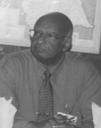 Retired army colonel Carl Morgan said drug trafficking and corruption in high places were responsible for the violent criminal uprising and he dismissed claims that ex-servicemen were behind the two recent mass killings, asserting that there were two gangs, one of which was associated with the drugs trade and the other comprising home-grown terrorists who saw no future in a society offering few opportunities.
Retired army colonel Carl Morgan said drug trafficking and corruption in high places were responsible for the violent criminal uprising and he dismissed claims that ex-servicemen were behind the two recent mass killings, asserting that there were two gangs, one of which was associated with the drugs trade and the other comprising home-grown terrorists who saw no future in a society offering few opportunities.
Morgan, the current President of the Georgetown Chamber of Commerce is also the President of the Guyana Legion and a member of the Board of Trustees of the Guyana Veterans Foundation. He told Stabroek News in an interview on Tuesday that several ex-servicemen were particularly disturbed at recent utterances by President Bharrat Jagdeo and other government officials that former soldiers were behind the slaughter of innocents at Lusignan and Bartica. Morgan said those comments were unfortunate, noting that a quick look at the wanted criminals and those who had been killed would reveal that none of them was an ex-serviceman. “We cannot just apportion blame to anyone and randomly accuse people… If we don’t know who are the killers then let’s stay quiet,” Morgan stated. He said he noticed that Jagdeo, at his recent press conference, attempted to clear the air on the issue, saying that 99% of the servicemen might be living orderly lives. Morgan said this was a welcome development although he was of the firm view that the damage had already been done.
On March 6, government spokesman Dr Roger Luncheon said it was no secret that ex-servicemen were involved with criminal gangs. “I don’t believe it is a secret that many of the gangs have benefited from the presence of former members of the joint services,” Luncheon said at his post-cabinet media briefing. His comments were made two days after former army officers Oliver Hinckson and Dorian Massay had been arrested by the police. Hinckson has since been charged with advocating the commission of a terrorist act and uttering seditious statements. He allegedly made these statements at a City Hall press conference on February 1.
Mediation
Hinckson had told members of the media that he, along with other servicemen, was prepared to mediate between the gunmen and the authorities to bring calm. Asked whether his organisations were prepared to play a role in any negotiation, Morgan said they were not interested in mediating with criminals. He said what was needed was for the authorities to identify who the people behind the gunmen were and those were the people to be spoken to. He said mediation was only one part of the solution, noting that the authorities had to get to the root of the crime problem and remove the fertile ground on which drug trafficking and corruption thrive.
The former army officer said both the Veterans Foundation and the Guyana Legion could play a role in giving advice and lending their expertise in the fight against crime, but he said they had never been formally asked to do so.
It had been said that a number of ex-servicemen had hit hard times and many of them might have become disgruntled with the political situation and had decided to pick-up arms against the state. Asked whether his association had any knowledge of this, Morgan said no, adding that the members of the Guyana Legion were mostly war veterans who were too weak to fight. He said members of the Veterans Foundation were mainly ex-soldiers who were also not engaged in any type of criminal activity. “Look, those who are not too old to be part of anything are busy trying to make a living,” Morgan commented.
It was put to him that the ex-servicemen did not have to be young and strong to strategise and guide the gunmen. “That is so, but we have no information on that,” the former army officer said.
He said he would not deny that there could be ex-servicemen who had taken the wrong path. However, as far as he was aware, there was no evidence to make any broad statement on a criminal link. “The bulk of the robbery and the killings we see today are being committed by men in their 20s… we see no ex-serviceman on the police wanted list.”
The killers
Asked who he thought might be behind the killings, Morgan said the country was confronted by two gangs – one linked to the drugs trade and the other a band of home-grown terrorists who have no future in a society where there are few opportunities. He added that certain elements in society especially those with strong connections to narcotics and weapons trafficking have capitalised on these vulnerable groups and have succeeded in using them to carry out their activities. Morgan, who is also the vice chairman of the Private Sector Commission and CEO of MMC Security Force, said it served the purpose of drug dealers to have an unstable society – which was what was prevailing at the moment – as it was easier for them to carry out their nefarious activities. While law enforcement authorities were sidetracked hunting down gunmen, drug shipments were flowing through the country’s porous borders, he said. “But what we face as a nation is not peculiar to us; other Caricom nations are experiencing similar crises, although their problems might be as a result of a different source,” Morgan observed.
Caricom leaders will be meeting next month in Trinidad to discuss and find solutions to stem the tide of violence across the 15-nation bloc. On January 26 and February 17, gunmen slaughtered 23 people at Lusignan and Bartica. Police have since only charged one man with the Lusignan killings. The authorities said that a gang, led by the country’s most wanted man, Rondell ‘Fineman’ Rawlins, was behind the killings. But security officials believe there is a link between the Bartica killing and drug operatives.
Security experts blamed the criminal uprising on the lack of a national security strategy, but the Jagdeo administration insisted that it had a strategy in the UK-funded security sector action plan.
Foreign experts
Morgan said there was a feeling among many that foreign experts could come and solve the country’s security troubles overnight; a position he disagreed with. He said one need not look too far to see that this was not the case, pointing to Jamaica, which for the past several years had had British experts working in senior positions in the police service. He noted that Jamaica’s crime situation was no better than it was before. “It takes time and will, so we can have a good strategy but if we do not clean up the corruption and drug-running that are fuelling the crime problem then we are not going anywhere,” Morgan said.
Asked what needed to be done urgently, Morgan said that in addition to rooting out corruption from the top to the bottom, the authorities needed to look at the root causes of the violence the country had been experiencing over the years. Several political parties and civic groups had in the past called on the administration to look into the root causes of the crime problem. When the violence broke out along the East Coast in 2002 following the Mash Day prison break there had also been calls for an inquiry into those activities.
On whether the security forces were capable of defeating the criminals, Morgan said he had no doubt that if properly managed the lawmen could be effective. However, he said that in the current situation where both the army and the police forces were under strength it would be difficult for them to deal with any form of widespread criminality. The security forces had been found wanting in a series of high-profile criminal operations dating back to the assault at Agricola which claimed the lives of eight people. In that incident as well as the two recent killing sprees, the security forces’ response was slow, although during the last two they were said to have been on high alert.
When implemented, the UK-funded plan would build the operational capacity of the police force in terms of a uniformed response to serious crime, as well as augment forensics, crime intelligence and traffic policing capabilities. It would also strengthen policymaking across the security sector to make it more transparent, effective and better coordinated.





